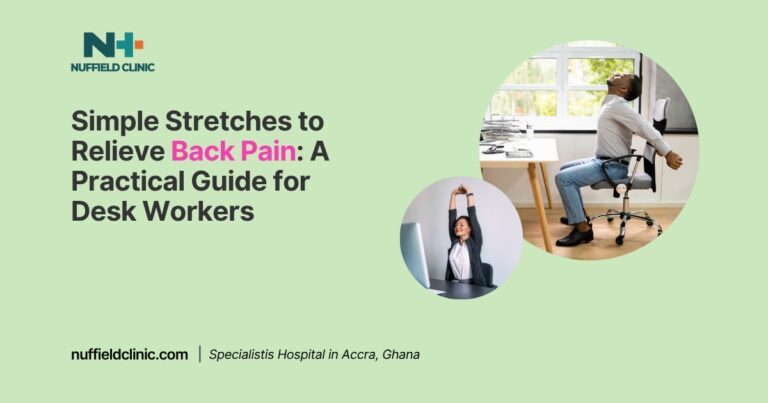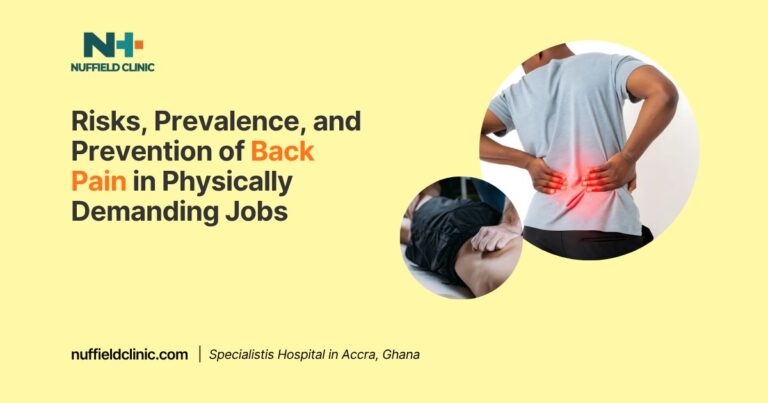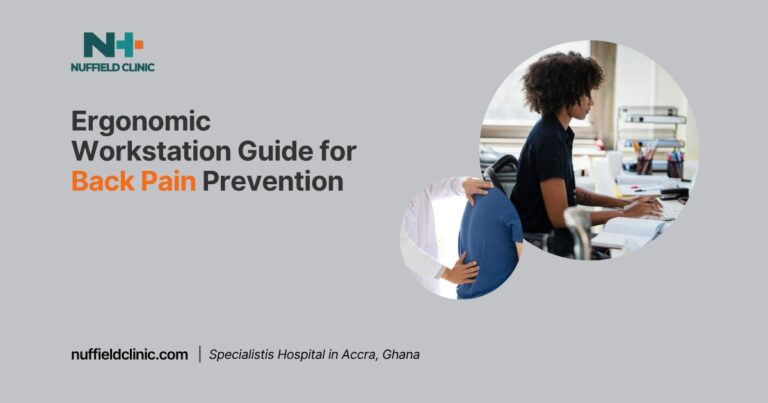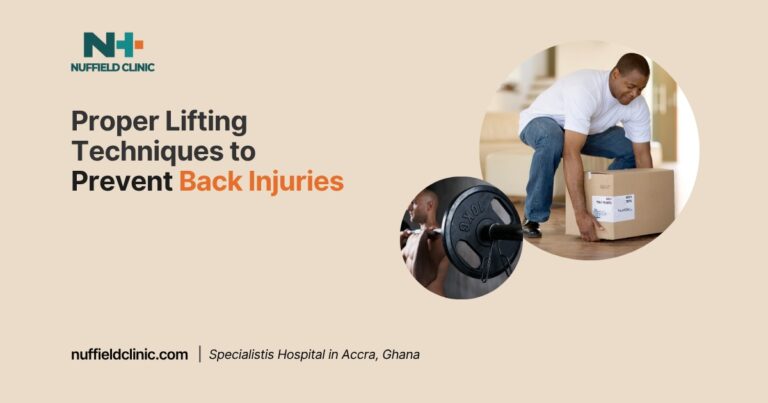These 6 Signs & Symptoms of Back Pain Require Professional Help
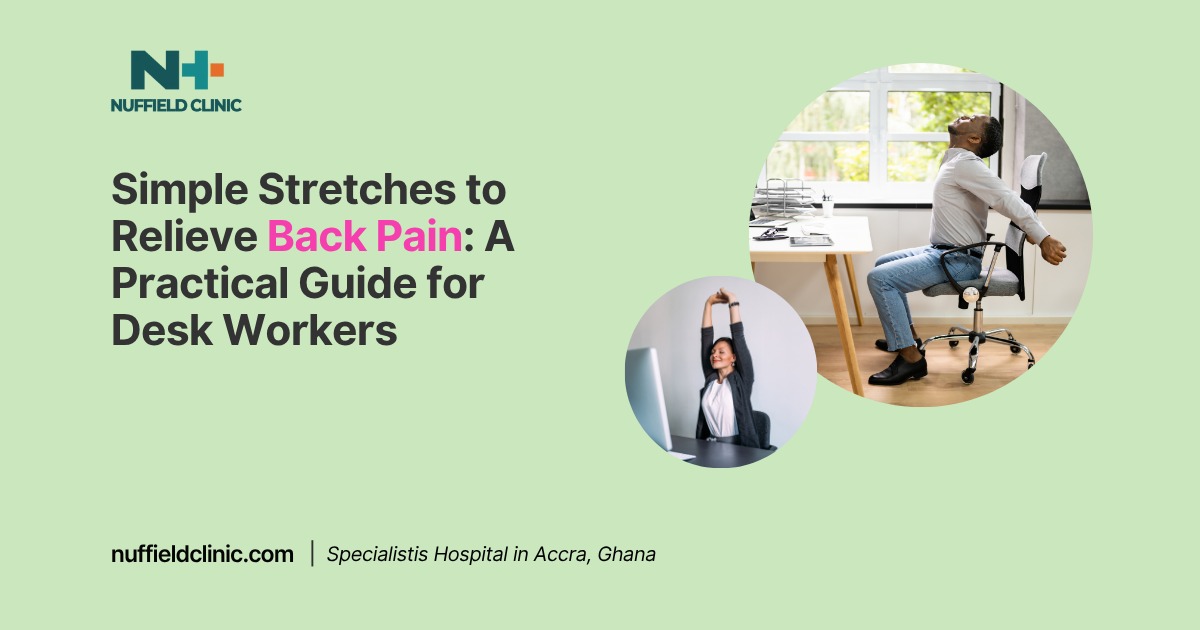
Back pain is one of the most common reasons people seek medical care, affecting nearly 80% of adults at some point. In Ghana and around the world, many cases improve within days or weeks with simple rest and home remedies.
However, certain signs point to more serious problems that cannot be ignored.
Recognising these warning signals and knowing when to seek professional help can prevent complications and protect long-term spinal health.
Persistent or Chronic Pain
Most back pain improves with rest, stretching, or simple pain relievers.
When discomfort lasts more than a week without improvement, or continues for more than six weeks, it moves into the category of chronic pain.
Persistent pain often signals structural issues such as disc problems or spinal arthritis.
A timely visit to a doctor or physical therapist helps uncover the cause and prevents small problems from becoming severe.
Pain That Radiates or Spreads
Pain confined to one spot may improve with self-care, but radiating pain raises concern.
When discomfort spreads down the glutes, thighs, or legs, the underlying issue may involve a pinched nerve, herniated disc, or spinal stenosis.
Shooting pain in the arms suggests cervical nerve involvement.
Radiating pain is often linked to nerve irritation, which, if left untreated, can cause lasting damage.
Numbness, Tingling, or Weakness
Back pain accompanied by numbness, tingling, or weakness in the limbs is a red flag.
These symptoms point to nerve compression or irritation. In some cases, delayed care leads to permanent nerve damage.
Weakness in the legs or arms is particularly concerning because it suggests the nervous system is not functioning as it should. Seeking professional help as soon as these symptoms appear is essential.
Pain That Worsens at Night or in Specific Positions
Night-time back pain, pain that disrupts sleep, or pain that worsens when lying down or sitting can indicate more than muscle strain. Disc degeneration, fractures, or in rare cases, tumours or infections may cause this pattern.
Unlike ordinary muscle fatigue, these pains follow no clear recovery cycle, making medical assessment necessary.
Back Pain After an Accident or Trauma
Accidents such as falls, car crashes, or workplace injuries should never be taken lightly. Even when the pain seems mild at first, underlying fractures or ligament injuries may exist. Older adults are especially vulnerable to spinal fractures from relatively minor falls. Any back pain following trauma requires immediate medical evaluation.
Unexplained Weight Loss and Fever
Unexpected weight loss without lifestyle or dietary changes, when paired with back pain, can signal infection or spinal tumours.
Fever combined with pain also points to infection, such as a spinal abscess or kidney infection.
In these cases, prompt medical care is critical. Ignoring these symptoms risks serious complications.
When Back Pain Becomes an Emergency
Some signs require immediate emergency attention. Loss of bladder or bowel control is often linked to cauda equina syndrome, a rare but serious condition caused by severe nerve compression.
Numbness in the groin or gluteal region, known as saddle anaesthesia, is another alarming symptom.
Sudden, severe leg weakness combined with incontinence or numbness is an emergency requiring urgent intervention, often surgery.
Rarely, severe back pain accompanied by chest or abdominal pain can be linked to vascular emergencies such as a ruptured aneurysm, which is life-threatening and demands immediate hospital care.
Common Causes and Risk Factors
While serious conditions need urgent care, many people in Ghana experience back pain from more common causes such as muscle strains, ligament sprains, herniated or bulging discs, arthritis, or osteoporosis. Poor posture, especially during prolonged desk work, also contributes.
Risk factors include ageing, excess weight, smoking, weak core muscles, and occupations involving heavy lifting. Stress and anxiety play a role by increasing muscle tension.
Role of Physical Therapy
Physical therapy often makes the difference between temporary relief and long-term recovery. A skilled therapist evaluates posture, strength, and movement patterns to pinpoint the root cause of pain.
Treatment includes tailored exercises, stretches, manual therapy, and education on safe lifting and posture. For many patients, this approach prevents the need for surgery.
At Nuffield Clinic here in Accra, Ghana, we provide advanced physiotherapy care, helping patients manage pain effectively and regain function.
Prevention Strategies
Preventing back pain starts with small, consistent habits. Regular low-impact exercise, such as swimming or brisk walking, strengthens supporting muscles. Core and flexibility training protect the spine and reduce strain.
Maintaining a healthy weight eases pressure on the lower back, while quitting smoking improves circulation to spinal tissues.
Good posture at work and home, lifting with the knees instead of the back, and taking breaks from prolonged sitting all make a difference. Stress management also reduces muscle tension that contributes to pain.
Back pain is common, but certain signs should never be ignored. Persistent pain, radiating discomfort, numbness, weakness, pain after trauma, unexplained weight loss, or fever all require professional attention. Emergencies such as sudden incontinence, severe weakness, or saddle anaesthesia demand urgent care.
Seeking help early not only eases pain but also prevents lasting complications. For reliable treatment and personalised care, clinics like Nuffield Clinic provide expert physiotherapy and medical support.
Protecting your back health today ensures mobility and comfort for years to come.



